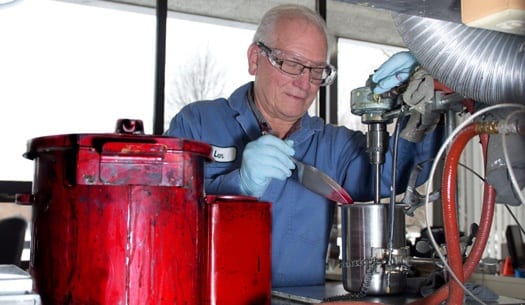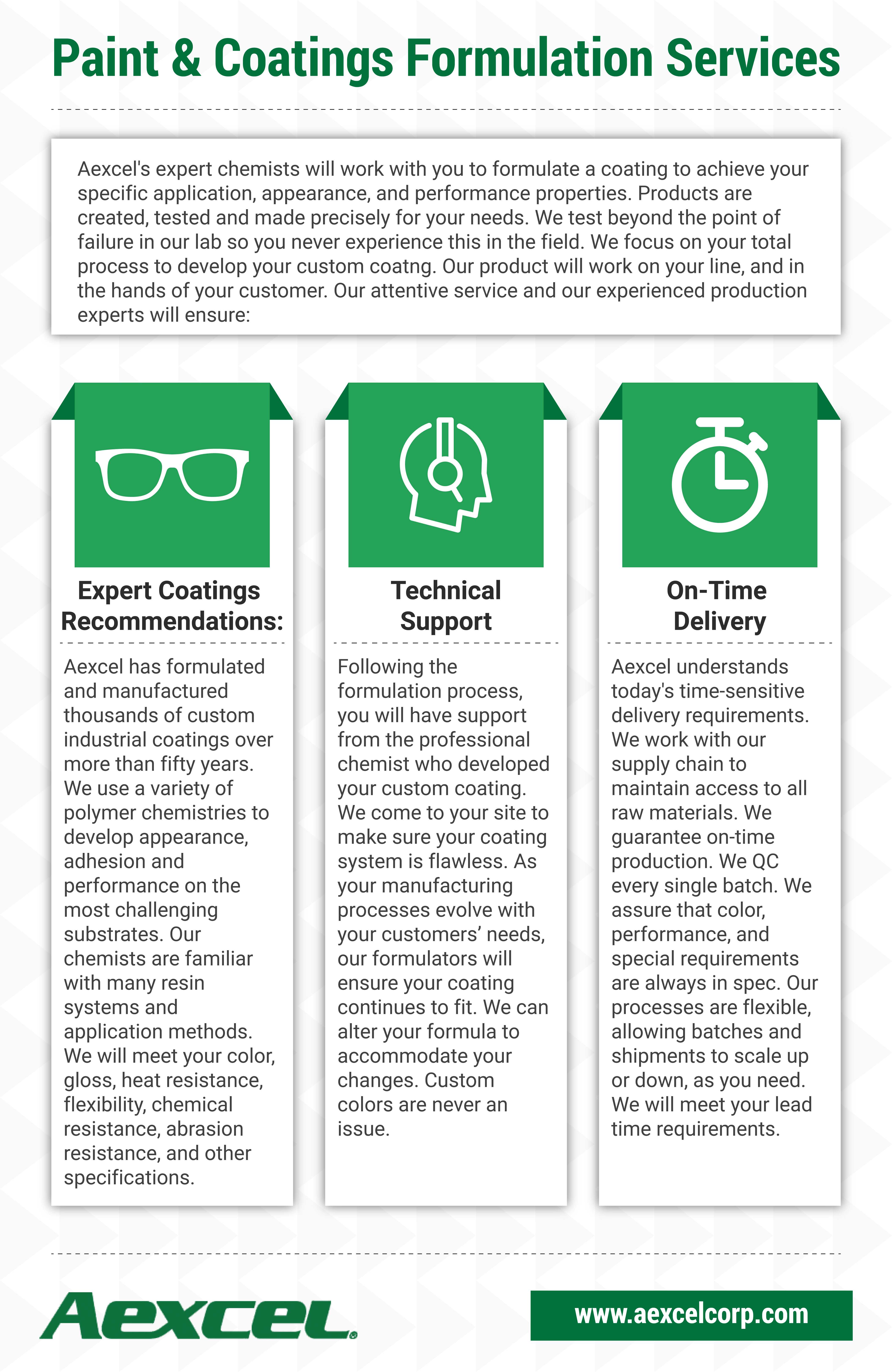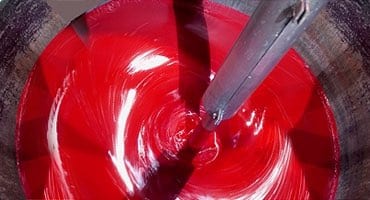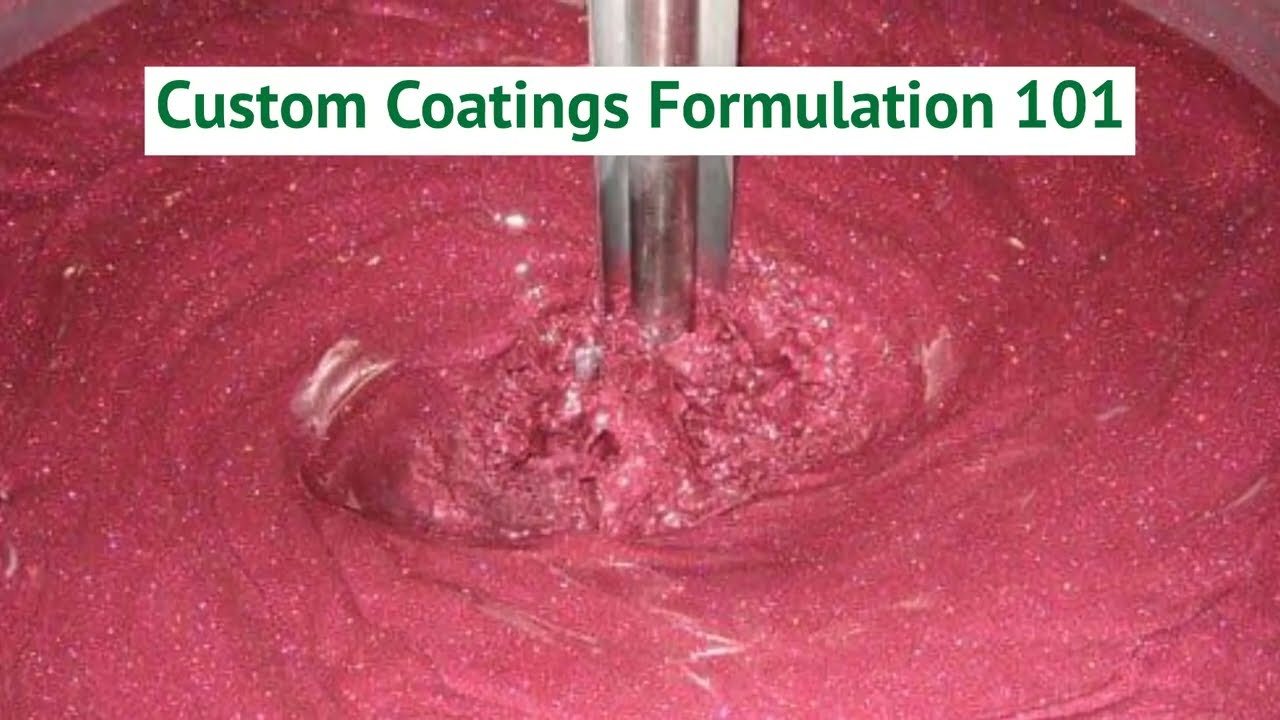
An industrial coating is a type of paint that forms a protective barrier against chemical, mechanical, and environmental degradation. When properly formulated, these coatings significantly enhance the wear resistance and appearance of everything from industrial machinery to concrete flooring. The custom coating formulation process allows the coating's formulation to be optimized for various project-specific requirements.
At Aexcel, our coating formulation chemists work with customers to create durable, easy-to-apply custom coatings according to their performance requirements and manufacturing operations.
Everything from the substrate's properties to the anticipated coating application method is used to create the perfect coating chemistry for your operation. Specific considerations include:
- Substrates: Steel, galvanized steel, treated steel, bronze, aluminum, plastics, concrete, asphalt, wood, primed surfaces, and paperboard
- Chemistries: 1k and 2k urethane, 1k and 2k polyurethane, polyurea, epoxy, vinyl, acetone, acrylic, methyl methacrylate, MMA, latex, alkyd, water-reducible alkyd, alkyd latex hybrid, soy-based alkyd, zinc coatings, solvent-based coatings, and low-VOC coatings
- Properties: Color, color retention, gloss, formability, durability, flexibility, and VOC & environmental considerations
High-Performance Industrial Custom Coatings from Aexcel
Aexcel's formulation experts create custom coatings solutions that are tailored for specific end-use environments. With your coating line and process arrangements in mind, we customize the coating formulation to provide optimal output and easy application. This customer-focused approach allows us to deliver:
- Personalized coating recommendations: Leveraging over 50 years of coating expertise, we provide detailed formulation recommendations based on your existing or planned production line and the desired end-use of the product. Our chemists have experience with various application methods, curing mechanisms, and resin systems, allowing us to create unique coating chemistries for some of the most challenging substrates and conditions. Our goal is to deliver coating solutions that meet your performance and aesthetic requirements while fitting effortlessly into your process line setup.
- Reliable technical support: After the coating solution has been delivered, we maintain a relationship with our customers to provide advice and technical support as needed. We can also work with you to develop new or modified coating solutions as your manufacturing process grows or changes over time.
- Quality control: With our dedicated quality control center, we work hard to ensure that each batch complies with your specific performance, safety, and environmental standards. Our standard quality control procedures can also be adapted to accommodate unique or challenging requests.
- On-time delivery: Working closely with a set of trusted suppliers, we ensure timely delivery of all raw materials required to complete each coating project. This translates to minimal lead times and on-time delivery of the final product.

Everything from the substrate's properties to the anticipated coating application method is used to create the perfect coating chemistry for your operation. Specific considerations include:
- Substrates: Steel, galvanized steel, treated steel, bronze, aluminum, plastics, concrete, asphalt, wood, primed surfaces, and paperboard
- Chemistries: 1k and 2k urethane, 1k and 2k polyurethane, polyurea, epoxy, vinyl, acetone, acrylic, methyl methacrylate, MMA, latex, alkyd, water-reducible alkyd, alkyd latex hybrid, soy-based alkyd, zinc coatings, solvent-based coatings, and low-VOC coatings
- Properties: Color, color retention, gloss, formability, durability, flexibility, and VOC & environmental considerations
Working with an experienced custom formulator is critical to ensure that your custom coating solution meets all relevant performance, quality, environmental, and process-specific needs. Specific benefits of a custom formulator include:
- Manufacturing process flexibility: Manufacturers are sometimes hesitant to explore alternative coating options since switching products often necessitates completely new equipment or an extensive reconfiguration of the current setup. At Aexcel, we develop coating chemistries that can utilize your existing or future equipment and application processes. With continued customer support after purchase, your product can also be adjusted as your manufacturing process and production cycles naturally evolve.
- Cost savings: Custom coatings are often the most cost-effective coating option since their formulation is tailored to your unique requirements. Aexcel considers several key data points when creating your optimal formulation, including:
- Anticipated production line throughput
- Specific environmental concerns
- Aesthetic and performance requirements
- Increased control: The custom coating formulation process enables precise control over the final product’s quality and properties. Aexcel works with each customer to make key formulation decisions and explore potential cost-saving options when developing a coating solution.
Custom Coatings Formulation 101
A product's coating plays a critical role in its ability to handle certain types of environments. When creating a custom coating formulation, the coating can be optimized to provide the exact properties required to support the application. To ensure optimal coating quality and specificity, the following factors should be considered during the formulation process:
- Intended use: The most important factor to keep in mind during the custom coating formulation process is the product's end-use. For example, coatings formulated for industrial tools and heavy equipment often require special additives that will improve their resistance to cracking, wear, and other physical stresses.
- Required raw materials: Once your end-use specifications have been defined, the next step is to determine which ingredients will provide the desired performance. Industrial custom coatings are comprised of several elements in varying proportions, including:
- Pigments
- Binders
- Resins
- Solvents
- Additives
- Limitations and special considerations: Depending on the coating's intended use, certain safety or performance requirements may limit your formulation options. For example, low-VOC formulations may be required for coating applications in VOC-restricted areas.
- Appearance and performance considerations: When customizing your coating, it is important to consider appearance and performance characteristics that will increase your product's appeal to the desired consumer base. The custom coating process allows you to formulate marketable solutions that meet a range of unique aesthetic, environmental, and functional requirements.
Having this level of control over the formulation process is especially beneficial in the following scenarios:
- Developing a new formulation: Developing a new coating formulation involves combining ingredients in a novel way to create a unique, application-specific product. With this approach, it is important to clearly define your performance and cost expectations before starting the process.
- Fine-tuning an existing formulation: The chemistry of an existing coating formulation can be slightly modified to add or enhance certain functional or aesthetic properties. In most cases, the goal is to improve some aspect of the coating's performance while maintaining or reducing its cost.
- Testing a new ingredient: Evaluating ingredient alternatives in an existing formulation may be necessary when one of the product's current ingredients has been discontinued. This approach is also useful when looking for ways to consolidate raw materials.
The Importance of Solvents: Types, Benefits, and Applications
Solvents are essential for dissolving components in the coating's formulation and creating the desired coating consistency. Consequently, choosing the right solvent for a specific formulation is critical to the final product's quality. Factors to consider when comparing your solvent options include:
- Solvent performance: One of the most important factors to consider is the solvent's performance, which is determined by its physical properties as well as the influence it has on the coating's physical properties. The ideal solvent will meet the coating's performance and safety criteria while accommodating the desired method of application.
- Solvent types: Solvents are available in several types categorized as either organic or inorganic depending on whether they contain carbon. It is important to choose a solvent that is chemically compatible with the coating materials being dissolved.
- Health, safety, and environment (HSE) issues: The solvent's potential HSE effects should also be considered to ensure a safe and compliant final product. Relevant HSE issues include:
- VOC content
- Toxicology
- Flammability/reactivity
- Biodegradability
- Odor
Solvent selection can be complicated since there are often trade-offs between performance and HSE issues. Working with a coating formulation expert can help you narrow your options and identify the most beneficial solvent or solvent blend according to your project's requirements.
Custom coating formulations provide several benefits over off-the-shelf coating products, including:
- Enhanced specificity: While off-the-shelf coatings are designed to a predetermined set of standards, custom coating formulations can be optimized to meet unique requirements. Everything from the coating's color strength and gloss level to its UV resistance can be customized to ensure maximum quality and usability.
- Improved compliance with VOC regulations: Unlike off-the-shelf solutions, custom coating formulations can be customized and refined to meet various local and federal regulations regarding VOC emissions.
- Flexibility: With custom coating formulation, the coating solution can be adapted to work with your existing equipment line.

Contact Us for Your Coating/Paint Formulation Needs
At Aexcel, we deliver high-quality custom coating and paint formulations that are perfectly matched to our customers' exact needs. From abrasion-resistant industrial coatings to eco-friendly soy-based traffic paint, our solutions can be optimized for a range of unique or challenging end-use environments. To learn more about our custom coating formulation services, please contact us today.




